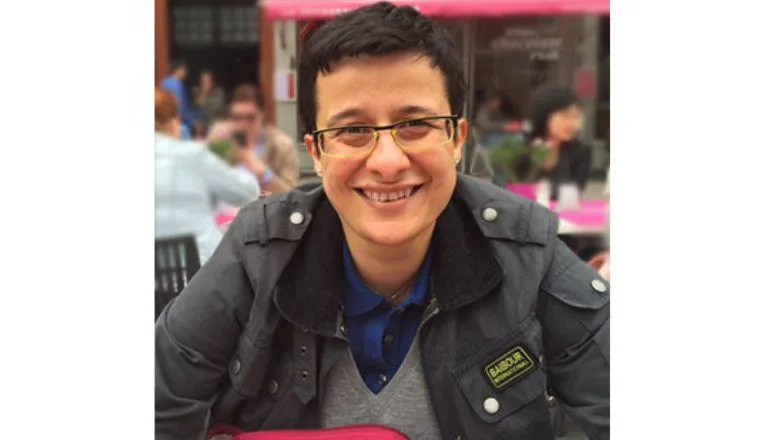Mathematics encourage logical and critical thinking. This is a useful skill to have in life. Studying mathematics, enhances students’ problem-solving abilities and communication skills. You cannot communicate well unless you understand and worked on the topic you are communicating about, and mathematics help with this."
09 October 2022
King's women in maths: Maria Kalli
Maria Kalli interview

Who are you and what is your area of research?
I am Dr Maria Kalli, a Lecturer in Statistics. My research is in Bayesian methods and time series analysis with applications in economics and finance. I am interested in Bayesian nonparametrics and related computational methods, as well as Bayesian high dimensional regression and related shrinkage priors.
Tell us about something you are working on at the moment - what is exciting about it?
Currently, I am working on a Bayesian nonparametric vector autoregressive model with time varying weights. This is a flexible model for analysing the complex dynamic behaviour of multivariate macroeconomic and financial time series (interest rates, inflation, employment rate, output growth, credit spread, etc). What is exciting about this model, is its ability to identify a structural change (i.e. when the economy moves from an expansion to a recession) and its excellent forecasting performance. Such models are useful to Central Banks because they can help with their monetary policy decisions. Reliable estimation of when the economy is about to transition to a recession, and what are the main drivers of this transition, can lead to more informed and strategic approach to help mitigate the economic impact of this transition.
What is the best thing about mathematics?
As a statistician, I love the fact that we use mathematical functions to build models that help us gain a better understanding of the world around us. The statistical analysis of data is not just about the calculation of summary measures such as means, and medians. It is about building the model that best describes the data, ensuring the model works and then using it to make predictions that can help in making good decisions about the future.
What do you think is holding women back from pursuing a career/degree in the maths field?
Society, and how it perceives mathematics. Over the years people tend to think that mathematics is difficult and not a subject that should be pursued by women. I think this mid set needs to change. Of course, mathematics can be difficult, but that should not stop interested students from studying maths and certainly not women.
What is the most unexpectedly pleasant event that has happened to you since entering mathematics?
Meeting my husband. He is a statistician too. I was a PhD student interested in Bayesian methods, and my supervisor suggested going to a seminar at Imperial College London, given by a young up and coming lecturer who also worked in the same area. That was it, the rest is history as they say.
What inspired you to take up mathematics?
I was always good mathematics, but I never thought I was going to join the field. It was in year eight (12 years old) my class’s mathematics teacher was great. He has an unconventional and unique of teaching mathematics. He would not just talk about mathematical functions and mathematical operations, but he would also link these to real life examples.
What do you hope to achieve through your work at King’s?
In terms of research, my goal is to develop flexible statistical models that can be applied in the areas of finance and economics. My plan is to be able to build user friendly apps/software of these models to facilitate their use by Central Banks, government agencies and the private sector. In terms of teaching, I want to help students understand the wide applications of statistics and see how enjoyable it is to carry out statistical analysis. I hope to inspire students to pursue a career in the field.
What are the biggest challenges you encounter in your research field?
Unconscious bias. As a woman you have to work twice as hard in order for your work to be taken seriously.
Tell us about a way maths affects everyday life in 2022
Examples of how mathematics affect everyday life in 2022 are: 1) Statistical models used to forecast inflation, 2) Measuring the impact the current energy crisis has on individual households, 3) Epidemiological models to predict pandemics, 4) Assessing the impact of the new Covid-19 vaccines on transmissibility and prevation of hospitalisation, 5) Measuring the detrimental effect of sewage discharge in seas and rivers, the list goes on and on.
What advice would you give to someone considering studying maths?
Do not let anyone stop you from studying mathematics. If this what you love, then pursue a career in the subject. There will up and downs but stay focused and never give up.
What are your thoughts on maths in general and women in mathematics?
Mathematics is a powerful tool for global understanding and communication, so the future is bright. Things are getting better for women in mathematics, both in terms of career development, promotion, and recognition. There is still a way to go.
What do you do in your spare time?
I love baking. I only started to bake when I was a PhD student. I found it relaxing because I was able to quickly see the result of my effort. I always liked classical music and opera (my grandmother was a pianist) and I used to play the Bassoon in the school orchestra. I am addicted the Duffer Brothers’ series “Stranger Things”, the Amazon series “The Boys” and Neflix’s “The Umbrella Academy”.

